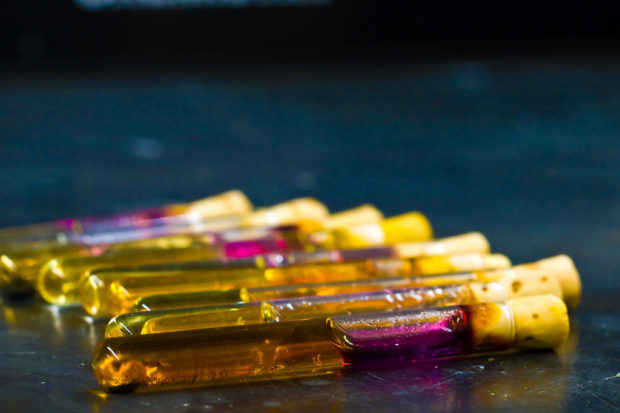
The American Chemical Society, the world’s largest scientific organization, recently honored Helen M. Free and her late husband at a National Historic Chemical Landmark. Helen, who deserves to be better known by the general public, serves as a positive role model for women—not only in science but also in all professions.
The commemorative plaque unveiled in a ceremony at Elkhart, Indiana, at which Helen and all nine Free children were present, read: “A Miles Laboratories research team led by Alfred and Helen Free developed the first diagnostic test strip—Clinistix—for detecting glucose in urine. Reagent-impregnated strips changed color based on the concentration of glucose.
This breakthrough led to additional dip-and-read tests for proteins and other substances. These innovations, along with instrument-based measurement of glucose in fingertip blood, provided patients with an inexpensive means to aid in the management of diabetes and kidney disease, significantly improving their quality of life.”
About 16 million Americans suffer from diabetes, due largely to runaway obesity, and the Frees’ development was revolutionary because it enabled people with diabetes to monitor their glucose levels at home, saving them trips to the doctor.
During their research the Frees reversed the usual tradition of reminding children to flush. They made their kids work as a urine production facility. Since they had to store the urine, Helen, known affectionately at large as the “Pee Queen,” issued the caveat, “Beware of anything yellow in the refrigerator. It may not be Mountain Dew.”
Helen Murray was born on February 20, 1923 in Pittsburgh, PA and acquired her early education in Ohio. She graduated as a straight-A student and salutatorian from Poland High School and entered the College of Wooster, preparing to be an English and Latin teacher. After the attack on Pearl Harbor, her dorm housemother convinced her of the great need for scientists.
In 1944 Helen received her B.S. degree in chemistry from Wooster; she received a Distinguished Alumnae Award in 1980. In 1978 she received her M.A degree from Central Michigan University. In 1944 Helen became a control chemist at Miles Laboratories. In 1947 she married biochemist Alfred H. Free; “I married the boss, which is one of the smartest moves I’ve ever made,” she quipped.
Helen and Al coauthored “Urodynamics: Concepts Relating to Urinalysis” (1972) and “Urinalysis in Clinical Laboratory Practice” (1975), both still standards in the field. She authored or coauthored over 200 publications and holds seven patents.
In 2000 Helen and Al, who died earlier that year, were inducted into the National Inventors Hall of Fame. She retired in 1982 but still serves as consultant to Bayer Diagnostics, the successor to Miles Laboratories. Besides her pioneering medical techniques, she works tirelessly to promote chemistry and other sciences among the public.
In 1976 Helen received the American Society for Medical Technology’s Professional Achievement Award. In 1990 she was elected president of the American Association for Clinical Chemistry. In 1980 she received the American Chemical Society’s Garvan Medal recognizing “distinguished service to chemistry by women chemists.” In 1993 she became the first non-Ph.D. president in the ACS’s 117-year history, as well as YWCA Woman of the Year.
Helen considered her number-one priority “to get the whole world to understand that they can’t get along without chemistry.” She explained, “Only a small percentage of Americans know the basic facts of science. Many teachers, intimidated by a subject that they know little about, avoid or abbreviate science lessons. In this climate, it is easy for people to accept pseudoscience and the claims of interest groups with anti-science agendas.” She once heatedly expressed her annoyance, “I’m a chemist, and I’m sick and tired of being the one that’s blamed for all the bad things that happen, when all the good things like medicine are also the results of chemistry.”
In 1995 the ACS established the Helen M. Free Award for Public Outreach, with Helen as the first recipient. On August 20, 2002 at Boston she introduced me as that year’s Helen M. Free awardee, and on October 16, 2007 I was privileged to return the favor when I introduced her in Fresno, where she addressed our ACS San Joaquin Valley Section on “The Diabetes Epidemic.”
